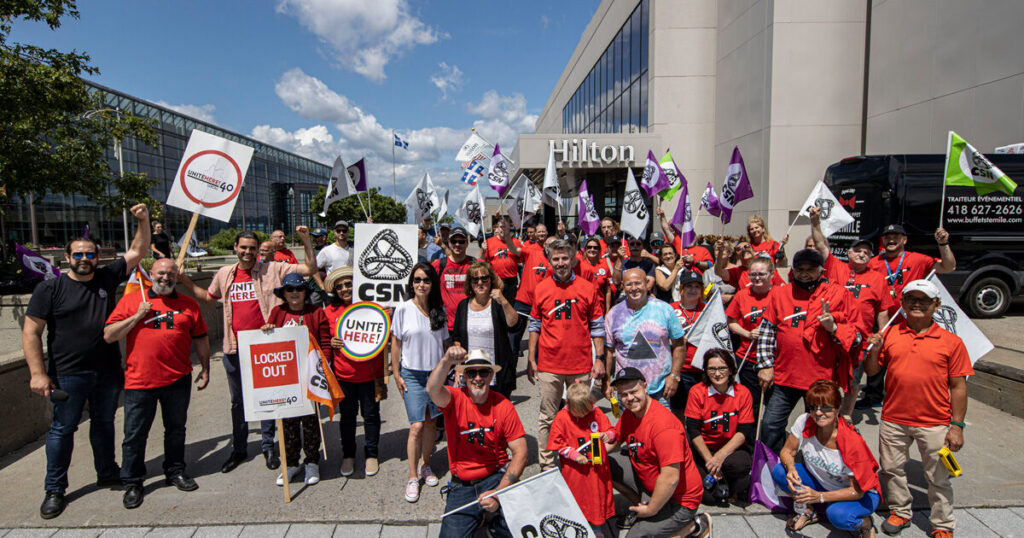As the summer season gets underway, the 3,500 workers at 30 CSN-affiliated hotels in Quebec are in a tug-of-war with their bosses over decent working conditions. At the beginning of June, the pressure tactics of the 11th coordinated hotel negotiations began with visibility actions. Still without an agreement after several weeks of bargaining, workers may soon be seeking strike mandates to break the deadlock in talks. This is already the case for workers at the Queen Elizabeth Hotel in Montreal, who have adopted a 95% strike mandate.
To find out more about the state of negotiations, North Star spoke to Fernando Almaraz, president of the Côte-de-Liesse hotel workers' union, who sits on the coordinated bargaining steering committee.
The last round of bargaining took place in 2020. At that time, the hotel industry was hit hard by the pandemic. As a result, Almaraz explains, workers had to make concessions on wage demands.
"At the last negotiation, we settled a lot of what we call the normative [work organization], as we were in a pandemic period. Now, the main problem we have is wages."
"I think I'm not wrong if I say that our hotel has the lowest wages in the entire industry. That's becoming the main problem, because salaries are so low that they don't really allow employees to participate in economic life. At our place, we have employees who have to take on a second or third job to be able to pay for their necessities."
At the hotel where Almaraz works, room attendants earn $17 per hour. However, according to Almaraz, the employer could afford to pay the workers more. "This isn't hidden or secret information. The hotel business has seen significant gains during 2023 and 2024. And they're congratulating each other on this 2024 season, which is going to be good. So, employers have the money."
While inflation is hurting workers who are struggling to pay for their necessities, according to Almaraz, hotels are playing their part by inflating their prices. "We must not forget that the employer participates in this inflation. What I mean is that the employer is taking advantage of this to raise room rates. Not to $10, $20, but to $200. And that's wealth that doesn't trickle down to the employees."

Hotels are also using more employees from employment agencies. These employees are not unionized, so the employer can unilaterally decide their working conditions.
Almaraz explains; "They take advantage of the precariousness of the employees. An immigrant worker who comes here, the rents are expensive, the cost of living is expensive. He needs to take a job, any job, just to survive. He'll accept bad conditions. We also see the fact that this employee doesn't know his rights, doesn't have access to resources. So he's a victim of savage exploitation."
The unions involved in coordinated bargaining are therefore calling for wage increases of 36% over four years to make up for the loss of purchasing power due to inflation. Added to this is the demand for a greater employer contribution to insurance.
"There are hotels where the employer's contribution is 65%. But there are other places like ours where participation is 50/50. We're asking for 55%. Yes, obviously, it's to the employee's advantage, but it's also to the employer's advantage to have a force of healthy workers."
Indeed, the work performed in hotels is sometimes very physically demanding. "If you're doing a job that takes a toll on your body, I'm thinking of room attendants, especially banquet workers who put up chairs every day for years; so to have access to insurance at a good price, maybe even free, it allows you to have a force of workers who are going to be able to do the job."
For its part, the employer side comes to the table without really making any counter-offer to the union proposals. "At the moment, the employer is presenting itself with almost no demands. Is it a strategy? We'll have to see. But their attitude is to present themselves without demands precisely because management wants to take advantage of this season."
So, in order to continue profiting from the season, the bosses want to avoid taking the risk of workers going on strike. But some are more aggressive than others. "There are always instances where management takes an aggressive stance. I can tell you that in our case, management's attitude is much more aggressive. Even if management shows up without any demands, that doesn't mean they're going to accept union demands."
However, coordinated bargaining has proven in the past to deliver significant gains for workers. "One of the main gains of coordinated bargaining was precisely to recognize tips as part of workers' wages. Because before, benefits such as sick leave, holidays and vacations were always calculated on the base salary."
Other important victories of this strategy include significant wage increases and a pension plan. For Almaraz, winning his demands "always comes down to a balance of power and visibility".
- Quebec Hotel workers demand a 9% annual wage increase
- Strike votes to come in the Quebec hotel industry
- More and more Quebec hotels prepare to strike
- Major strike in Quebec to wake up hotel giants
- Several surprise strike days for Quebec hotel workers
- Hotel workers on strike against bosses who exploit tax havens


